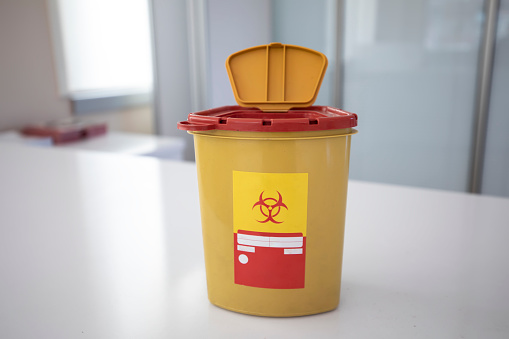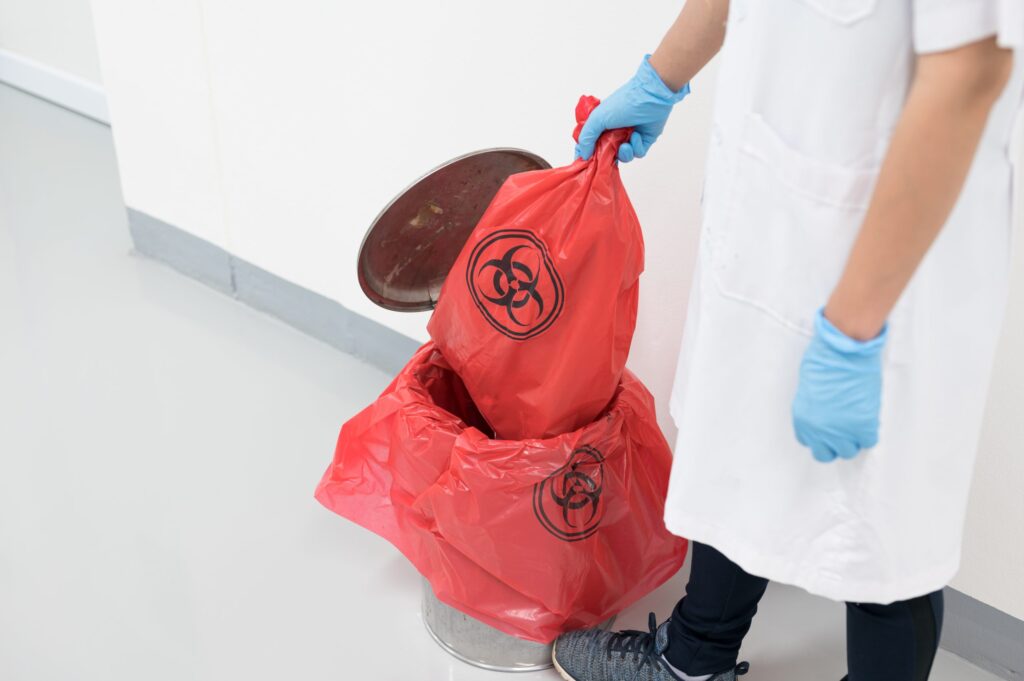The hospital waste disposal system can be quite a headache for any healthcare facility. Not only do you have to deal with the costs of disposal of clinical waste, but you also have to manage the time and energy it takes to properly dispose of hazardous materials.
Thankfully, there are several actions you may take to simplify the procedure. In this blog post, we’ll discuss various ways in which healthcare facilities can streamline their hospital waste disposal processes, from using software to outsourcing services.
Read on to learn more about having an easier and more effective hospital waste disposal system for time management.
How Can It Be Managed?
There are a few ways to manage the disposal of clinical waste so it is not as time-consuming. One way is to have a central waste management system.
This system can be used to store and dispose of all types of medical waste. It is important to have a system in place so that all medical waste is disposed of properly and in a timely manner.
Another way to manage hospital waste disposal is to have separate containers for different types of waste. This will help to keep the hospital organized and make it easier to find the right type of container when disposing of medical waste.
It is also important to label the containers so that they are easily identifiable. Finally, it is important to train staff on how to properly dispose of medical waste.
This training should include proper procedures for handling and disposing of sharp objects, biohazardous materials, and other types of hazardous waste. By educating staff on the proper way to dispose of medical waste, hospitals can ensure that their facilities are safe and clean.

What Are Some Tips To Make It Easier?
Some tips to make it easier for you to manage your hospital waste disposal include:
- Schedule regular pickups: Having a regular schedule for pickups can help you to stay on top of your waste disposal and ensure that nothing gets missed.
- Keep a track of what is being disposed of: Keeping track of what is being disposed of can help you to identify any potential issues early on and take corrective action if necessary.
- Educate staff on proper waste disposal procedures: Ensuring that all staff members are aware of the correct procedures for waste disposal can help to avoid any potential problems.
- Implement a segregation system: Segregating waste properly can make it much easier to dispose of, and will also reduce the risk of contamination.
- Use appropriate storage containers: Using the right storage containers for your hospital waste can help to keep it contained and organized, making it easier to dispose of when the time comes.
How To Properly Dispose Of Medical Waste
Medical waste can be defined as any disposal of clinical waste that is generated in the diagnosis, treatment, or immunisation of human beings or animals, in research pertaining thereto, or in the production or testing of biological waste.
It can also be referred to as healthcare waste, clinical waste, or simply hospital waste.
The four primary types of medical waste are as follows: Thankfully, there are several actions you may take to simplify the procedure.
- Infectious waste
- Pathological waste
- Pharmaceutical waste
- Sharps
Infectious Waste
Infectious wastes are those that contain pathogens – microorganisms that can cause disease in humans.
They include items such as used tissues and needles, body fluids like blood and urine, cultures and stocks of infectious agents from laboratories, and surgical materials including dressing and gowns.
Pathological Waste
Pathological wastes are derived from animals or humans and include tissue specimens and body parts removed during autopsies or surgeries as well as fluids drained from cavities.
Pharmaceutical Waste
This category encompasses a wide range of wastes including unused or outdated medications, containing controlled substances, chemotherapy, sharps associated with their administration (i.e. needles and syringes), and contaminated packaging like IV bags and tubing.
Sharps
Sharps are any devices with sharp points or edges that can puncture or cut skin. They include hypodermic needles, syringes with needles attached, lancets, auto-injectors, scalpels.
Proper hospital waste disposal is essential for the health and safety of both staff and patients. It can be difficult to manage, but implementing a few easy steps can make it much easier.
Regularly evaluate your facility’s waste management practices, create an efficient system for sorting and disposing of medical waste, and establish clear procedures that everyone in the organisation must follow.
With these steps in place, you can ensure that your healthcare facility maintains safe and effective disposal practices without wasting precious time.

What Are The Benefits Of This Method?
The article discusses the benefits of using a healthcare waste management company to help with the disposal of hospital waste.
The author states that using a veterinary waste disposal company can save time, money, and hassle for the hospital staff. They will pick up the waste from the hospital and dispose of it properly.
This can free up time for the hospital staff to focus on their patients. Additionally, it can save money for the hospital as they will not have to pay for someone to dispose of the waste themselves.
Stay Eco-Friendly by Adopting Proper Recycling Service
Assuming that you are looking to adopt a recycling service to help make your hospital waste disposal more eco-friendly, there are a few things to keep in mind.
First, you want to make sure that the recycling service you choose offers pick-up for medical waste. This can include items like syringes, gloves, and other medical supplies that need to dispose of properly.
Second, you want to make sure that the recycling service has experience in handling hospital waste. This way, you can be sure that your waste will recycle properly and not end up in a landfill.
Finally, you want to make sure that the recycling service is affordable. This is important because you want to be able to continue using the service without breaking your budget.
Choosing The Best Waste Disposal Company
When it comes to choosing a waste disposal company for your hospital, there are a few things you should keep in mind. The first is to make sure that the company is licensed and insured. This will protect you in the event that something goes wrong with the disposal process.
The price of the service is another factor to take into account. Some companies will charge by the pound, while others will charge a flat rate. Prior to choosing, make sure to compare pricing.
Finally, you should ask about the company’s experience. Check out online reviews and request references. You want to make sure that you’re working with a company that has a good track record.
Following these tips should help you find a good waste disposal company for your hospital. You can identify a business that offers exceptional service at an affordable price with a little investigation.
Several Equipment and Types Used in the Process of Waste Disposal
There are many types of equipment and methods used in hospital waste disposal. Some common methods are autoclaving incineration and steam sterilisation.
Autoclaving is a process of using high pressure and heat to kill microorganisms on medical instruments and other materials. This method is often used for surgical instruments, dressings, and other items that come into contact with blood or body fluids.
Incineration is a process of burning hospital waste at very high temperatures. This method uses to destroy hazardous materials such as chemicals, sharps, and infectious waste.
Steam sterilisation is a process of using steam to kill microorganisms on medical instruments and other materials. This method is often used for surgical instruments, dressings, and other items that come into contact with blood or body fluids.
Conclusion
Waste management is an important service to ensure the efficient disposal of waste, and it’s essential that you choose a waste management service provider that meets all your needs.
From safe and responsible collection methods to proper handling and disposal, there are numerous factors to consider when selecting a suitable provider.
We hope this article has given you some insight into what exactly you should be looking for in disposal of clinical waste service providers so that you can make an informed decision when selecting the best one for your business or organisation.
